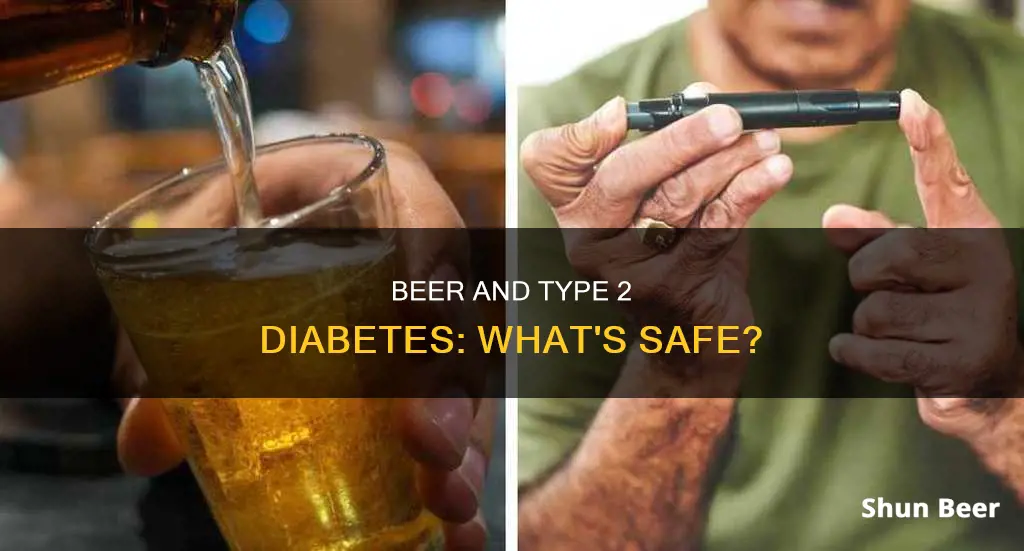
Drinking alcohol when you have type 2 diabetes is a complex issue. While it is generally agreed that people with type 2 diabetes do not need to cut alcohol out of their diet entirely, there are some important safety considerations to keep in mind. For example, drinking on an empty stomach can lead to hypoglycemia, as alcohol interferes with the liver's ability to regulate blood sugar. Additionally, alcohol can contain a lot of calories, which can lead to weight gain and increase the risk of developing type 2 diabetes. It is recommended that people with type 2 diabetes who choose to drink alcohol do so in moderation, limiting their intake to one drink per day for women and two drinks per day for men.
| Characteristics | Values |
|---|---|
| Can people with type 2 diabetes drink beer? | Yes, but in moderation and with safety considerations. |
| How much is too much? | No more than one drink a day for women and up to two drinks a day for men. |
| What is one drink of beer? | 12 ounces, or one can or bottle of beer. |
| What about larger servings? | A 24-ounce can, common at sports stadiums, counts as two drinks. |
| Are there alternatives to beer? | "Light" beers have fewer carbs, alcohol, and calories. |
| How does beer impact blood sugar? | Beer is high in carbs, which can affect blood sugar. It can also slow down carb metabolism, potentially causing hypoglycemia. |
| What are the risks of drinking with type 2 diabetes? | Drinking can lead to hypoglycemia, especially with insulin or other medications. It can also cloud judgment, affect weight, and increase health risks such as raised blood pressure, neuropathy, dehydration, and sleep disruption. |
| What precautions should be taken? | Don't drink on an empty stomach. Eat food with alcohol, stay hydrated, and monitor blood sugar levels before, during, and up to 24 hours after drinking. |
What You'll Learn

Drinking beer may lead to hypoglycemia
The risk of hypoglycemia is further heightened for individuals with type 2 diabetes, particularly if they are taking insulin or medications like sulfonylureas that increase insulin production. Since insulin lowers blood sugar levels, the reduced glucose production by the liver can cause blood sugar levels to drop too low. Additionally, alcohol can interfere with the liver's ability to regulate glucose levels and interact with certain medications, further increasing the risk of hypoglycemia.
To prevent hypoglycemia, individuals with type 2 diabetes should avoid drinking on an empty stomach and monitor their blood sugar levels while drinking and for up to 24 hours afterward. It is also important to drink in moderation, following recommended guidelines for alcohol consumption, and to consult with a healthcare professional for personalized advice.
Understanding the Math: 79 Beers Minus 40
You may want to see also

Alcohol competes with the liver's ability to make glucose
Alcohol can affect blood sugar levels in people with type 2 diabetes, especially if they are on insulin or other anti-hyperglycemic medications. This is because the liver is responsible for both detoxifying the body of alcohol and regulating blood sugar levels by storing and producing glucose. When the liver is busy breaking down alcohol, it prioritises this task, and may not release enough glucose to keep blood sugar levels high. This can lead to dangerously low blood sugar, or hypoglycemia, for up to 24 hours after drinking.
The risk of hypoglycemia is increased if drinking on an empty stomach or when blood sugar levels are already low. Alcohol can also impair your ability to recognise the warning signs of hypoglycemia, so it is important to regularly monitor your blood sugar levels when drinking.
To prevent hypoglycemia, it is recommended that you do not drink on an empty stomach, and that you monitor your blood sugar levels before, during, and after drinking. It is also important to be aware of the amount of alcohol you are consuming and to drink at a slow or moderate pace. If you are taking insulin, be careful not to inject too much as alcohol increases the risk of hypoglycemia.
If you experience hypoglycemia, it is important to take immediate action to raise your blood sugar levels. If your blood sugar levels are between 55-69 mg/dL, ingest 15 grams of carbohydrates and then recheck your levels after 15 minutes. Continue doing this until your target blood sugar level is achieved. This is known as the Rule of 15.
If your blood sugar levels drop below 55 mg/dL, get medical help as soon as possible.
Beer Diet: Does It Work?
You may want to see also

Beer is a significant source of carbohydrates
Beer is made by fermenting grains such as barley and wheat, which naturally contain carbohydrates. Most beers also contain added sugars, further increasing their carbohydrate content. The amount of carbohydrates in beer varies depending on the type of beer and the fermentation process.
"Light" beers tend to have the fewest carbohydrates, usually five grams or fewer per serving. They also tend to be lower in alcohol content. Craft beers like IPAs and stouts, on the other hand, tend to be much higher in carbohydrates, typically containing 15 grams or more per serving. They also tend to be higher in calories and alcohol content.
Beer typically has more carbohydrates than other alcoholic drinks like wine or liquor. However, according to brewing expert Charles Bamforth, beer has been unfairly maligned as an unhealthy source of fattening carbohydrates. Bamforth argues that beer, in moderation, can be part of a low-carb diet and may even be a good source of soluble fibre and prebiotics that promote digestion. He notes that alcoholic drinks with mixers like ginger ale or cola contain far more carbohydrates than beer.
While beer may not be the most significant source of carbohydrates in one's diet, it is still something to be mindful of, especially for those watching their carbohydrate intake.
Lexapro and Alcohol: Is It Safe to Drink Beer?
You may want to see also

Excess alcohol is associated with an increased risk of type 2 diabetes
Excess alcohol intake is associated with an increased risk of type 2 diabetes. However, the relationship between alcohol and type 2 diabetes is complex, and other factors, such as family history, age, and ethnic background, also play a role. Here are some key points to consider:
Impact on Blood Sugar
Alcohol interferes with the liver's ability to regulate blood sugar. The liver stores excess glucose in the form of glycogen and releases it into the bloodstream when blood sugar levels dip. However, when alcohol is present, the liver prioritises breaking down alcohol over converting glycogen to glucose. This can lead to low blood sugar levels or hypoglycaemia, which is dangerous for people with type 2 diabetes, especially if they are on insulin or certain medications. Hypoglycaemia can last up to 24 hours after drinking and can be life-threatening.
Calories and Weight Gain
Alcoholic drinks are often high in calories, which can contribute to weight gain. Being overweight is a risk factor for developing type 2 diabetes. Therefore, drinking alcohol can indirectly increase the risk of type 2 diabetes by contributing to weight gain.
Health Risks
Excessive alcohol consumption is linked to various health issues, including raised blood pressure, nerve damage (neuropathy), dehydration, sleep disturbances, certain cancers, and heart disease. These health risks are particularly important for people with type 2 diabetes, as they can worsen diabetes-related complications.
Guidelines for Drinking
To minimise health risks, it is recommended not to drink more than 14 units of alcohol per week, spread over at least three days. This translates to no more than six medium glasses of wine or six pints of lager per week. It's important to note that drinking guidelines are the same for people with and without diabetes.
Strategies for Safer Drinking
If you have type 2 diabetes and choose to drink alcohol, it's crucial to follow certain strategies to minimise risks:
- Never drink on an empty stomach. Food slows down alcohol absorption and provides glucose.
- Choose low-sugar and low-carb beverages.
- Avoid drinking if your blood glucose levels are already low.
- Monitor your blood sugar levels before, during, and after drinking.
- Stay hydrated by drinking water.
- Know your limits and stick to them.
- Wear a medical ID bracelet to alert others to your condition.
In summary, while excess alcohol is associated with an increased risk of type 2 diabetes, it is not the sole cause. Other factors, such as genetics and lifestyle, also play a role. If you have type 2 diabetes and choose to drink, it's important to drink in moderation and follow safety guidelines to minimise the impact on your health.
Bottoms Up: How Do Self-Refilling Beer Cups Work?
You may want to see also

Drinking alcohol may lead to hyperglycemia
Drinking alcohol can affect your blood sugar levels, and for people with type 2 diabetes, this can be particularly significant. Alcohol can interfere with the complex mechanisms that balance your blood glucose, and while it may seem counterintuitive, it is more likely to lower than raise blood glucose. However, metabolic changes caused by alcohol consumption can lead to blood glucose extremes on either end, especially for those with diabetes.
How Alcohol Affects Blood Sugar
The liver plays a crucial role in maintaining blood sugar levels by storing carbohydrates and releasing them into the bloodstream when needed. However, the liver also metabolizes alcohol, and it cannot effectively perform both tasks simultaneously. When you consume alcohol, the liver prioritizes processing alcohol over maintaining blood sugar levels, which can lead to low blood sugar or hypoglycemia.
The Rebound Effect
While alcohol initially lowers blood sugar, some scientists believe that the body may rebound into a state of high blood sugar as the liver resumes its glucose-regulating function. This phenomenon is known as the Somogyi effect and may be more common in people with diabetes. However, there is ongoing debate in the scientific community about whether the Somogyi effect is a genuine syndrome.
Chronic Alcohol Consumption and Hyperglycemia
Chronic alcohol consumption can lead to long-term changes in blood glucose regulation. Over time, alcohol can decrease the body's ability to respond appropriately to insulin, resulting in insulin resistance. This effect is observed not only in people with confirmed alcoholism but also in healthy individuals who are heavy drinkers. According to the National Institute of Alcohol Abuse and Alcoholism, a significant proportion of individuals with alcoholic liver disease are either diabetic or glucose intolerant, indicating a progression towards full-blown diabetes.
Managing Alcohol Consumption with Type 2 Diabetes
If you have type 2 diabetes, it is essential to understand the risks and take precautions when consuming alcohol. Here are some key considerations:
- Moderation is key: Limit your alcohol intake to no more than one drink per day for women and up to two drinks per day for men. Excessive drinking (more than three drinks daily) can lead to higher blood glucose levels.
- Avoid drinking on an empty stomach: Always consume alcohol with food to reduce the risk of hypoglycemia.
- Monitor your blood sugar levels: Check your blood sugar levels frequently while drinking and up to 24 hours afterward.
- Choose lower-carb and lower-alcohol options: Opt for "light" beers, spirits with diet or sugar-free mixers, and dry wines or Prosecco instead of high-carb and high-alcohol beverages.
- Stay hydrated: Drink plenty of water along with your alcoholic beverages to maintain hydration.
- Be mindful of calories: Alcoholic drinks can be high in calories, which can contribute to weight gain and impact diabetes management.
- Consult your healthcare provider: Discuss your drinking habits with your doctor, as they can provide personalized advice and tips for drinking safely with type 2 diabetes.
Beer and Jury Duty: What's the Verdict?
You may want to see also
Frequently asked questions
Yes, you can drink beer if you have type 2 diabetes, but it's important to drink in moderation and be aware of how it affects your body.
Beer contains carbohydrates, which can cause a spike in blood sugar levels. Beer also interferes with your liver's ability to release stored glucose into the bloodstream, which can lead to low blood sugar (hypoglycemia).
Yes, drinking beer can increase your risk of hypoglycemia, especially if you are on insulin or other diabetes medications. It can also contribute to weight gain and increase your risk of chronic diseases such as heart disease, liver disease, and kidney disease.
Some studies suggest that light drinking may have benefits for people with type 2 diabetes, including slightly reducing blood glucose levels and increasing good cholesterol (HDL) levels. However, the risks may outweigh any potential benefits.
It is recommended to drink in moderation, choose low-carb and low-sugar beverages, never drink on an empty stomach, and monitor your blood sugar levels regularly. It is also important to be aware of the symptoms of hypoglycemia and carry a form of medical identification.







